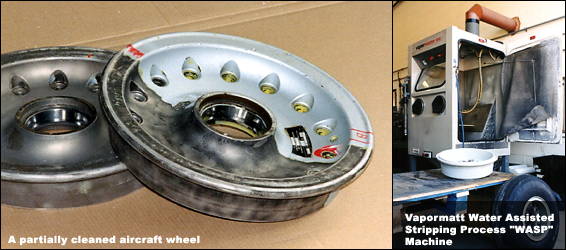The ‘Water-Assisted Stripping Process’ (‘WASP’) – developed by surface preparation specialist Vapormatt – is being adopted increasingly by airlines worldwide to speed up and streamline the degreasing and cleaning and, when necessary, the complete de-painting of aircraft wheels during regular maintenance operations.
WASP, based on the proven wet blasting principle, is a solvent- and dust-free process that employs an operator-safe cleaning solution comprising a special mix of water, detergent and “soft” plastic media. This is projected at the wheel through a special blast nozzle, which is normally manipulated by hand. The wheel is located on a powered or manual turntable and the whole process is self-contained within a single sealed enclosure. The standard machine enclosure can accommodate wheel diameters of up to 30ins (762mm) but bigger enclosure sizes are available to handle larger diameter wheels.
The operating pressure of the process is highly controllable, enabling it to be adjusted easily, either for cleaning/degreasing or complete de-painting. When used at low pressure, the process does not damage coated or anodised substrates, removing grease, oil, carbon and brake dust deposits quickly and effectively. Basically, it simulates hand scrubbing but without the laborious manual effort. Used at high pressure, the process provides rapid and simultaneous, paint stripping and contamination removal, again with no substrate damage. Effluent from the machine is processed through a filtration system, enabling solid waste to be separated out for safe disposal and allowing water to be recycled or go to drain.
Because WASP is self-contained, compact, simple to operate, safe in use and realistically priced compared to alternative wheel cleaning processes, it is particularly suitable for use by smaller, regional airlines, with their tighter space, time and labour restraints. A pioneer in the use of the Vapormatt WASP system is the highly successful and expanding UK regional airline, Flybe (British European), which has a system in operation at its Flybe Aviation Services maintenance base at Exeter International Airport in Devon, UK – one of the most comprehensive facilities of its kind in Europe.
Flybe installed one of the first WASP wheel cleaning machines and uses it, typically, to clean up to 10 wheels per day, seven-days a week, as well as for the degreasing and cleaning a variety of brake and wheel components and for complete wheel stripping, when required.
Base Workshop Engineer at Flybe Aviation Services, Paul Timms, who was responsible for introducing WASP, says: “We assessed a number of different options for dedicated wheel cleaning and found that the Vapormatt process best suited our operation, due to its compactness, ease of operation and the fact that no potentially harmful solvents are involved. The process has been in operation for a few years now and the machine has proved to be very reliable – an essential element for any busy airline maintenance facility.”
Although the standard WASP system is manually operated, Vapormatt is currently developing an automated system with adjustable blast nozzles that can be programmed to cater for different wheel diameters.























